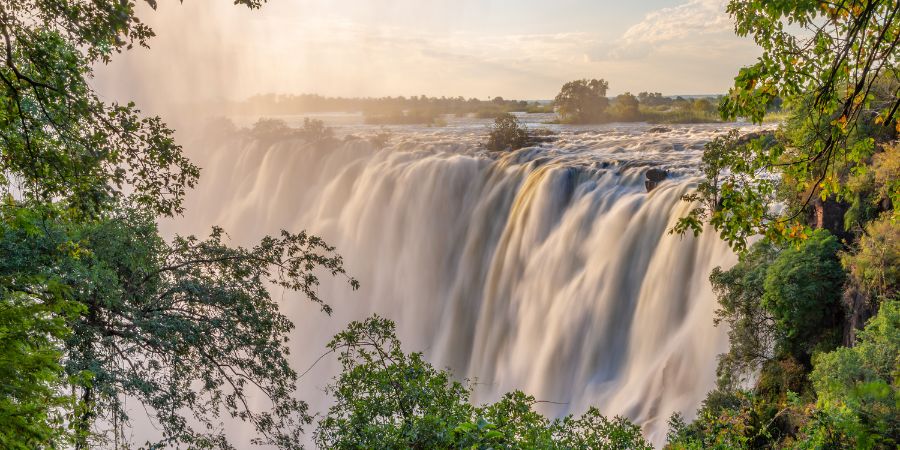$798$5,195

Zimbabwe, a landlocked country in Southern Africa, offers a rich tapestry of landscapes, abundant wildlife, and a blend of cultural heritage. Known for its friendly people and iconic landmarks like Victoria Falls, Zimbabwe is a destination for those seeking adventure, wildlife encounters, and a glimpse into Africa’s soul.
Geography and Climate
Zimbabwe is characterized by its varied topography which includes the high plateau of the Highveld, the central plains, and the Lowveld in the south. The country is bisected by the Great Dyke, rich in mineral and metal deposits. The climate is tropical, with a rainy season from November to March and a dry season from April to October.
Cultural Overview
Zimbabwe’s culture is a melting pot of Bantu-speaking ethnic groups, with the Shona and Ndebele being predominant. Traditional beliefs and customs coexist with modern influences, and the country is known for its art, particularly Shona stone sculptures.
Key Destinations
- Victoria Falls – One of the Seven Natural Wonders of the World, Victoria Falls is a breathtaking sight on the Zambezi River. Activities include white-water rafting, bungee jumping, and scenic helicopter flights.
- Harare – The capital city, known for its contemporary art scene, botanical gardens, and the National Heroes Acre.
- Great Zimbabwe – A UNESCO World Heritage site, these ancient ruins were once the capital of the Kingdom of Zimbabwe during the Late Iron Age.
- Hwange National Park – The largest national park in Zimbabwe, home to a high diversity of wildlife including elephants, lions, and African wild dogs.
- Mana Pools National Park – Known for its wildlife-rich floodplains and magnificent views of the Zambezi River, offering exceptional game viewing and canoe safaris.
- Matobo National Park – A UNESCO World Heritage site, notable for its unique rock formations and rich human history, including ancient San rock paintings.
Wildlife and Safari
Zimbabwe is a premier safari destination with several national parks and reserves. Wildlife viewing is excellent, particularly for elephants, lions, leopards, and buffalo. The country is also known for its efforts in rhinoceros conservation.
Adventure Activities
For the adventurous, Zimbabwe offers activities like bungee jumping at Victoria Falls, canoeing on the Zambezi River, and walking safaris in national parks. The Eastern Highlands also offer excellent opportunities for hiking and bird watching.
Cuisine
Zimbabwean cuisine is based on staple foods like maize and millet, often served with vegetables and meat. Specialties include sadza (a thick maize porridge), biltong (dried, cured meat), and game meat. Traditional beer, made from fermented maize or sorghum, is also popular.
Art and Music
Zimbabwe is renowned for its stone sculptures, an art form that expresses the cosmology of the Shona people. Music is an integral part of Zimbabwean culture, with traditional instruments like the mbira (thumb piano) playing a key role.
Best Time to Visit
The best time to visit Zimbabwe for wildlife viewing is during the dry season from May to October when animals congregate around rivers and waterholes. This period also coincides with lower malaria risk. Victoria Falls is most impressive from February to May, right after the region’s rainy season.
Cultural Etiquette
Respect for elders and traditional customs is important in Zimbabwe. Greetings are essential, and a handshake is the common form of greeting. It’s polite to ask permission before taking photographs of people.
Safety
While Zimbabwe has faced political and economic challenges, it is generally safe for tourists. Visitors should stay informed of current conditions and exercise standard safety precautions.
Transportation
The primary means of long-distance travel within Zimbabwe is by road. Bus services connect major cities, and car rental is available. For remote areas and national parks, 4×4 vehicles are recommended.
Accommodations
Zimbabwe offers a range of accommodation options, from luxury lodges and safari camps to budget guesthouses and campsites. Booking in advance is recommended, especially in popular tourist areas like Victoria Falls.
Shopping and Handicrafts
Local markets and craft centers offer a variety of souvenirs, including handwoven baskets, wooden carvings, and the famous Shona stone sculptures. Bargaining is common in markets.
Language
The official languages are English, Shona, and Sindebele. English is widely spoken, especially in urban areas and tourist destinations.
Festivals and Events
Zimbabwe hosts various cultural festivals and events, including the Harare International Festival of the Arts (HIFA) and the Zimbabwe International Book Fair.
Tips for Travelers
- Zimbabwe uses the US dollar as its main currency.
- Tap water may not be safe to drink everywhere; bottled water is recommended.
- WiFi and internet access can be limited, especially in remote areas.
- A visa may be required for entry, depending on your nationality.